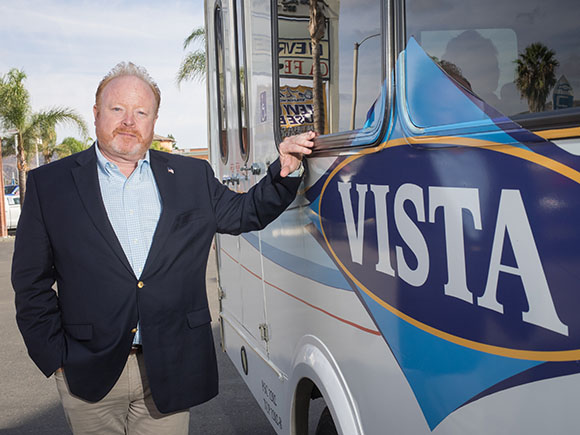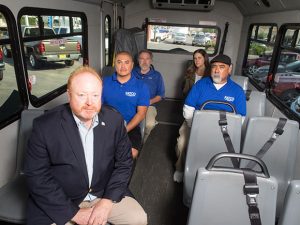
Chap Morris, owner of bus service Fillmore Area Transit Corp., stands alongside one of the company’s buses. After 40 years in business, the firm will shutter by February. (Nik Blaskovich / Business Times photo)
Amid a community backlash, the Ventura County Transportation Commission has decided to move forward with a five-year, multimillion-dollar contract with Dallas-based MV Transportation, effectively driving out 40-year-old Fillmore Area Transit Corp.
“I realize I’m up against the wall and I’m hitting the wall every time,” said Chap Morris, who owns the William L. Morris Chevrolet dealership in Fillmore and FATCO, a bus service his father founded in Fillmore in 1973. “It almost seems like they didn’t want a small business running it.”
The transit company will end its current contract with Ventura County Transportation Commission in February, when MV Transportation, which currently serves the majority of Ventura County, takes over services for the Fillmore and Santa Paula area. After servicing the area for nearly four decades, FATCO’s most recent contract with VCTC was due to end in January 2013, but it has since received three six-month-long extensions. It has now entered a fourth extension that will continue the term after its expected end date of Dec. 31, until February.
At its Nov. 7 meeting, VCTC voted 9-5 to finalize its earlier decision to discontinue the Fillmore company’s services and not go through with a “best and final” meeting, essentially another round of proposal bids and negotiations that was recommended by the Heritage Valley Transit Service policy advisory committee.
Jennifer Wiley, chief of staff to the CEO of MV Transportation, told the Business Times that the company is excited to expand its services from other areas of Ventura County, including the cities of Santa Paula and Fillmore and communities of Piru, Rancho Sespe and Bardsdale.
“MV Transportation is honored to be selected to negotiate the Fixed Route, Dial-a-ride and ADA [Americans with Disabilities Act] Paratransit Services contract for the Heritage Valley,” she wrote in an email. “Founded in Northern California almost 40 years ago, MV is proud of its long history of transporting people throughout the state of California.”
“MV Transportation was unanimously approved as the best choice,” said Vic Kamhi, bus transit director for VCTC. He said the commission evaluated proposals from three companies — FATCO, MV Transportation and Ride Right, a firm based in Missouri. MV scored the highest in categories including overall firm experience, operational plan, and executive management experience, while it also offered a lower price, Kamhi said.
“The federal government requires us to take competitive bids and not to give a local preference,” Kamhi said, before adding about FATCO, “They were considerably more expensive than MV, although that wasn’t the deciding factor … Their proposal was just not as strong, in terms of how they were going to deliver the service.”
In regard to pricing for the five-year contract, FATCO’s proposal ranged between $9.2 million and $12.8 million, while MV’s price was between $6.58 million and $10 million, according to Kamhi. The price range for Ride Right was $8.8 million to $12.77 million. FATCO’s higher price tag includes dial-a-ride services that would be cut by one-third under MV Transportation, a fact confirmed by both Morris and VCTC officials.
Kamhi said the current number of dial-a-ride services cannot be sustained while still growing the general number of fixed routes and other services. However, Morris said there is a real demand for the services.

Morris, far left, with the drivers of FATCO. (Nik Blaskovich / Business Times photo)
“I had to figure out how to do the dial-a-ride and still put it in the bid somehow,” Morris said. “Knowing how many people depend on this and knowing how many people wouldn’t be able to use the service, we had to make the decision morally and ethically to do something … This is why [our price is] so high — it’s because we’re doing this.”
Both firms previously completed rider surveys to evaluate passengers’ needs; however, their different proposals have now led to the expansion of MV and the end of FATCO.
Jackie Cervantes, operations manager for FATCO, said she has worked with the company for 24 years and sees many employees are disappointed to see it go out of business. MV has agreed to hire previous FATCO employees, and according to Cervantes, only three of the Fillmore company’s 34 employees have declined to have their personal information submitted to MV.
“They’ll have to go,” she said. “They’re going to have to go to where the job is.”
While it appears many of the employees will remain the same, the halt to FATCO services has still been met with some resistance. In a press release from FATCO, Limoneira Co. Property Manager Rosie Castillo said the bus service was there for Limoneira employees when they needed an extra bus route.
“Several years ago, because of budget constraints, the Santa Paula High School District was unable to bus our employees’ children to school,” Castillo said. “Fillmore Area Transit purchased a school bus and entered into an agreement to service the children of our employees.”
Ventura County Young Farmers and Ranchers, an organization based in Ventura, wrote a letter to VCTC in opposition of the commission’s new contract with MV.
“Over the years FATCO has helped the Ventura County Young Farmers and Ranchers through numerous obstacles, and on special occasions have donated their time and busses to assist us in serving our community,” the letter stated, adding that the organization’s board members “have personally witnessed FATCO go the extra mile … [and] sincerely fear the loss of such a great local business and community partner.”
The roots of FATCO go back to 1973, when the Fillmore city manager of the time showed up to the William Morris car dealership and asked the Morris family to start a bus service. The city needed a source of local transportation to avoid having its gas tax money reduced by 50 percent, Morris said.
“So my dad got a van and my mom…went down to the local mobile home park and offered some retired UPS drivers a chance to work for a bus company,” Morris said. “It passed the Litmus test, and so the city of Fillmore got to keep its money.”






 Print
Print Email
Email

















